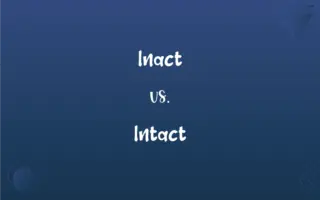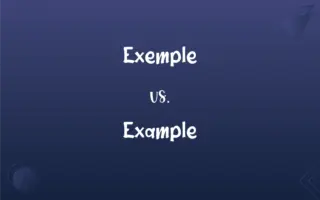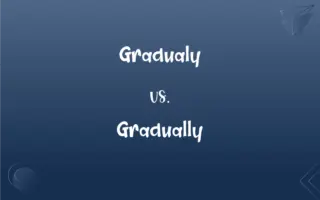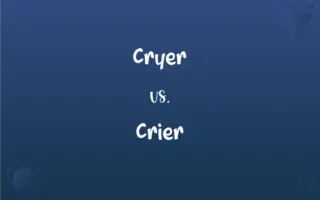Artefact vs. Artifact: Mastering the Correct Spelling
Edited by Harlon Moss || By Janet White || Updated on March 11, 2024
"Artefact" is the British spelling, while "Artifact" is the American spelling denoting a human-made object of cultural or historical interest.
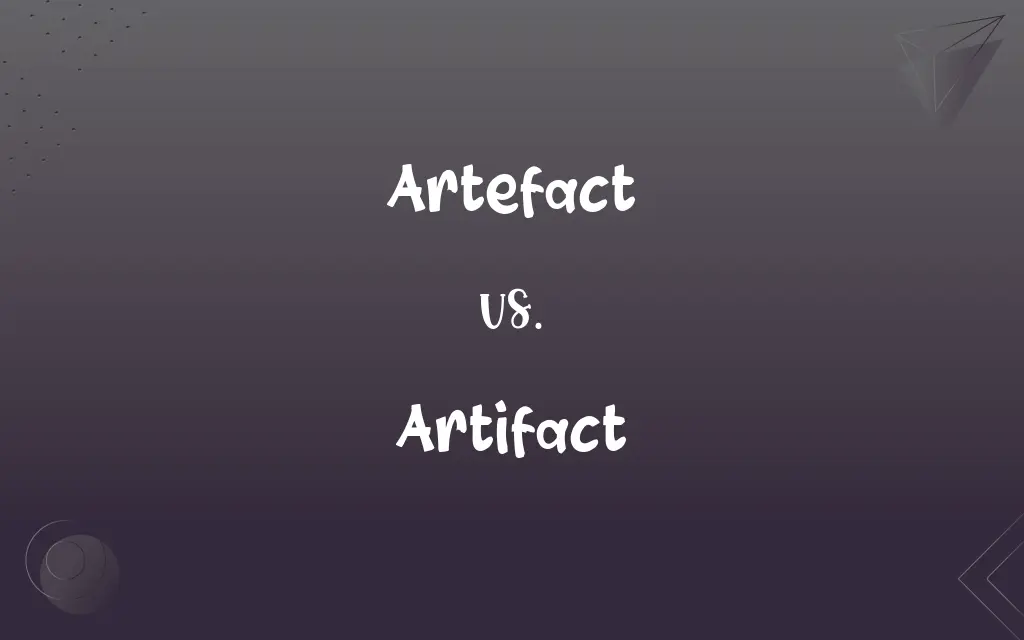
Which is correct: Artefact or Artifact
How to spell Artifact?

Artefact is Incorrect

Artifact is Correct
ADVERTISEMENT
Key Differences
Think of America starting with "A" for "Artifact" (American spelling).
Picture "Artifact" as containing "craft," highlighting its association with human crafting.
"Artifact" has "art" in it, which is synonymous with human-made objects.
Consider "Art" + "fact" = "Artifact" implying it's a fact of human creation.
Remember that "e" in "Artefact" stands for "English" (British spelling).
ADVERTISEMENT
Correct usage of Artifact
Archaeologists discovered a Roman artefact while excavating the site.
Archaeologists discovered a Roman artifact while excavating the site.
Each artefact in the museum tells a unique story.
Each artifact in the museum tells a unique story.
Artifact Definitions
A human-made object, typically of historical or cultural significance.
The museum displayed ancient artifacts from the Bronze Age.
A popular or latest designed product of human craftsmanship.
Modern smartphones are advanced artifacts of technology.
An object that represents a previous era in human society.
Native American artifacts are cherished for their historical value.
An object produced or shaped by human craft, especially a tool, weapon, or ornament of archaeological or historical interest.
Something viewed as a product of human conception or agency rather than an inherent element
"Morality is an artifact of human culture, devised to help us negotiate social relations" (Michael Pollan).
A phenomenon or feature not originally present or expected and caused by an interfering external agent, action, or process, as an unwanted feature in a microscopic specimen after fixation, in a digitally reproduced image, or in a digital audio recording.
An inaccurate observation, effect, or result, especially one resulting from the technology used in scientific investigation or from experimental error
The apparent pattern in the data was an artifact of the collection method.
An object made or shaped by human hand or labor.
An object made or shaped by some agent or intelligence, not necessarily of direct human origin.
Something viewed as a product of human agency or conception rather than an inherent element.
A finding or structure in an experiment or investigation that is not a true feature of the object under observation, but is a result of external action, the test arrangement, or an experimental error.
The spot on his lung turned out to be an artifact of the X-ray process.
(archaeology) An object, such as a tool, ornament, or weapon of archaeological or historical interest, especially such an object found at an archaeological excavation.
The dig produced many Roman artifacts.
(biology) An appearance or structure in protoplasm due to death, the method of preparation of specimens, or the use of reagents, and not present during life.
(computing) A perceptible distortion that appears in an audio or video file or a digital image as a result of applying a lossy compression or other inexact processing algorithm.
This JPEG image has been so highly compressed that it has unsightly artifacts, making it unsuitable for the cover of our magazine.
(museology) Any object in the collection of a museum. May be used sensu stricto only for human-made objects, or may include ones that are not human-made.
A product of human workmanship; - applied esp. to the simpler products of aboriginal art as distinguished from natural objects.
Any product of human workmanship; - applied both to objects made for practical purposes as well as works of art. It is contrasted to natural object, i.e. anything produced by natural forces without the intervention of man.
A structure or appearance in protoplasm due to death, method of preparation of specimens, or the use of reagents, and not present during life.
An object, oservation, phenomenon, or result arising from hidden or unexpected causes extraneous to the subject of a study, and therefore spurious and having potential to lead one to an erroneous conclusion, or to invalidate the study. In experimental science, artifacts may arise due to inadvertant contamination of equipment, faulty experimental design or faulty analysis, or unexpected effects of agencies not known to affect the system under study.
A man-made object taken as a whole
Something observed in a scientific investigation that wasn't naturally present but occurred as a result of the process.
The strange reading was just an artifact of the equipment.
A feature or structure seen in a microscopical preparation.
The stain showed an artifact, not a genuine feature of the specimen.
Artifact Sentences
Artifact handling requires special gloves to prevent damage.
The ancient artifact proved to be a significant find.
He donated a rare artifact to the local museum.
Artifact restoration can be a delicate and time-consuming process.
Discovering an artifact from your own ancestors can be quite moving.
The artifact was carefully examined by the experts.
Every artifact at the archaeological site was catalogued and studied.
Each artifact has a story that contributes to our understanding of history.
Artifact theft is a significant problem for museums worldwide.
FAQs
What is the pronunciation of Artifact?
It is pronounced as /ˈɑːr.tɪ.fækt/.
What is the verb form of Artifact?
"Artifact" is a noun and doesn't have a verb form.
Which vowel is used before Artifact?
The vowel "i" is used before "Artifact."
Which conjunction is used with Artifact?
Any conjunction can be used, depending on the sentence structure.
Why is it called Artifact?
It's called "Artifact" because it originates from the Latin "artefactum," meaning "something made with skill."
Is Artifact a negative or positive word?
Neutral. Its connotation depends on context.
What is the root word of Artifact?
The root is Latin "artefactum."
Which article is used with Artifact?
Both "a" and "the" can be used, depending on context.
Is Artifact an adverb?
No, "Artifact" is not an adverb.
What is the singular form of Artifact?
"Artifact" is itself singular.
What is the plural form of Artifact?
The plural is "artifacts."
Which preposition is used with Artifact?
Prepositions like "of," "from," and "in" can be used with "Artifact."
Is Artifact a noun or adjective?
"Artifact" is a noun.
Is Artifact an abstract noun?
No, "Artifact" represents tangible objects.
Is the Artifact term a metaphor?
No, unless used in a figurative context.
Is the word Artifact imperative?
No, "Artifact" is not an imperative form.
What is the first form of Artifact?
As a noun, "Artifact" doesn't have verb forms.
Is Artifact a countable noun?
Yes, "Artifact" is a countable noun.
Is Artifact a collective noun?
No, "Artifact" is not a collective noun.
What part of speech is Artifact?
"Artifact" is a noun.
What is another term for Artifact?
Another term is "relic."
How many syllables are in Artifact?
There are three syllables in "Artifact."
What is a stressed syllable in Artifact?
The first syllable "Ar" is stressed.
What is the opposite of Artifact?
There's no direct opposite, but "natural object" contrasts its human-made nature.
Which determiner is used with Artifact?
Determiners like "this," "that," "an" can be used.
How is Artifact used in a sentence?
"Artifact" is used to denote human-made objects, e.g., "The archaeologists discovered an ancient artifact during their excavation."
Is Artifact a vowel or consonant?
"Artifact" is a word containing both vowels and consonants.
How do we divide Artifact into syllables?
Ar-ti-fact.
What is the second form of Artifact?
"Artifact" doesn't have verb forms since it's a noun.
What is the third form of Artifact?
"Artifact" is a noun and doesn't have verb forms.
About Author
Written by
Janet WhiteJanet White has been an esteemed writer and blogger for Difference Wiki. Holding a Master's degree in Science and Medical Journalism from the prestigious Boston University, she has consistently demonstrated her expertise and passion for her field. When she's not immersed in her work, Janet relishes her time exercising, delving into a good book, and cherishing moments with friends and family.
Edited by
Harlon MossHarlon is a seasoned quality moderator and accomplished content writer for Difference Wiki. An alumnus of the prestigious University of California, he earned his degree in Computer Science. Leveraging his academic background, Harlon brings a meticulous and informed perspective to his work, ensuring content accuracy and excellence.
